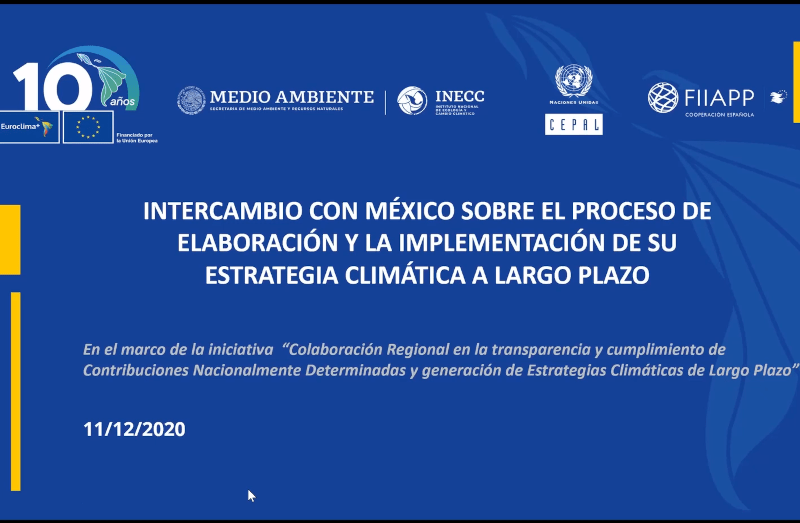An exchange was held with Mexican authorities to learn about and share their experience in the development and implementation of the half-century climate strategy.
Mexico City, December 11, 2020.- On Friday, December 11, a virtual meeting was held to deepen knowledge of Mexico's experience in the process followed for the development and implementation of its Half-Century Strategy, as well as how it has addressed the mitigation and adaptation components. It was also intended to facilitate exchange with the 5 countries in the region participating in the EUROCLIMA+-supported initiative, which are in the process of developing and/or implementing their Strategies.
This dialogue is part of the proposal “Regional Collaboration in the transparency and compliance of Nationally Determined Contributions and the generation of capacities for Long-Term Cimate Strategies”, supported by the EUROCLIMA+ programme through the implementing agencies FIIAPP, GIZ, ECLAC and UN Environment.
Under the framework of the adoption of the Paris Agreement in 2015, the Parties undertake a collective commitment to keep the increase in global average temperature below 2°C from pre-industrial levels, aiming to limit it to 1.5°C. The Paris Agreement itself establishes Nationally Determined Contributions (NDC) as the main instrument that each country must deliver, detailing its particular contribution to the collective goal. Specifically, Paragraph 19 of Article 4 invites the parties to work on Long-Term Climate Strategies (LTCS), with the aim of establishing a roadmap to frame subsequent NDCs, which need to be updated every 5 years, increasing their level of ambition to align themselves with the indications of the science on climate change.
In the context of Latin America, only Mexico and Costa Rica have formally submitted a Long-Term Climate Strategy to the UNFCCC Secretariat. Responding to the call for greater ambition and to comply with Article 4 of the Paris Agreement, the countries of the region are in different stages of formulating and developing their respective LTCS, together with the updating of their NDCs. Since the Paris Agreement does not go into detail with respect to the process or the minimum content required for the development of an LTCS, beyond that common but differentiated responsibilities will be taken into account, as well as the respective capacities of each country, according to its national contexts, there is a wide spectrum of methodologies, content and potential processes for NDC preparation.
The action “Regional Collaboration in the transparency and completion of Nationally Determined Contributions and building capacity for Long-Term Climate Strategies” developed by the EUROCLIMA+ programme, aims to reduce common gaps in the planning and implementation of climate actions in Argentina, Chile, Colombia, Costa Rica and Uruguay, through the creation of a network for long-term climate planning, with knowledge instruments and exchanges that serve its purpose. This action aims to strengthen countries' capacities to establish a long-term vision of resilient and low-emission development, through long-term climate strategies with a 2050 time horizon. In this context, the exchange of experiences with other countries that have presented their Strategy and are in the process of implementing them is considered to be very relevant. In particular, the increased knowledge of Mexico's experience, as the first Latin American country to submit its Strategy to the UNFCCC, is of particular interest to the countries participating in the initiative.
The event was attended by Amparo Martínez, Director General of the National Institute of Ecology and Climate Change (INECC); Marco Antonio Heredia, Director General of Public Climate Change Policies (SEMARNAT); Claudia Octaviano, General Coordinator of Climate Change Mitigation (INECC, Mexico); and Margarita Caso, General Coordinator of Adaptation to Climate Change (INECC, Mexico). The Mexican representatives presented the process of developing their Long-Term Climate Strategy (LTCS), explaining the institutional and regulatory framework in which this is inserted, the market instruments considered, the development of the vision and the advances in implementation. They also shared some of the lessons learned, the main challenges faced and the strengths developed in the process.
Representatives from Argentina, Chile, Colombia, Costa Rica, Uruguay, Panama, Honduras and El Salvador participated in the dialogue together with the members of their technical teams, plus representatives of the implementing agencies participating in the project (ECLAC, FIIAPP, GIZ, UNEP).
About EUROCLIMA+
EUROCLIMA+ is a programme funded by the European Union to promote environmentally sustainable and climate-resilient development in 18 Latin American countries, particularly for the benefit of the most vulnerable populations. The Programme is implemented under the synergistic work of seven agencies: Spanish Agency for International Cooperation for Development (AECID), French Development Agency (AFD), Economic Commission for Latin America and the Caribbean (ECLAC), the German Society for International Cooperation (GIZ), Expertise France (EF), the International and Ibero-American Foundation for Public Administration and Policy (FIIAPP), and UN Environment.
Contact:
Daniel Fernández This email address is being protected from spambots. You need JavaScript enabled to view it.

